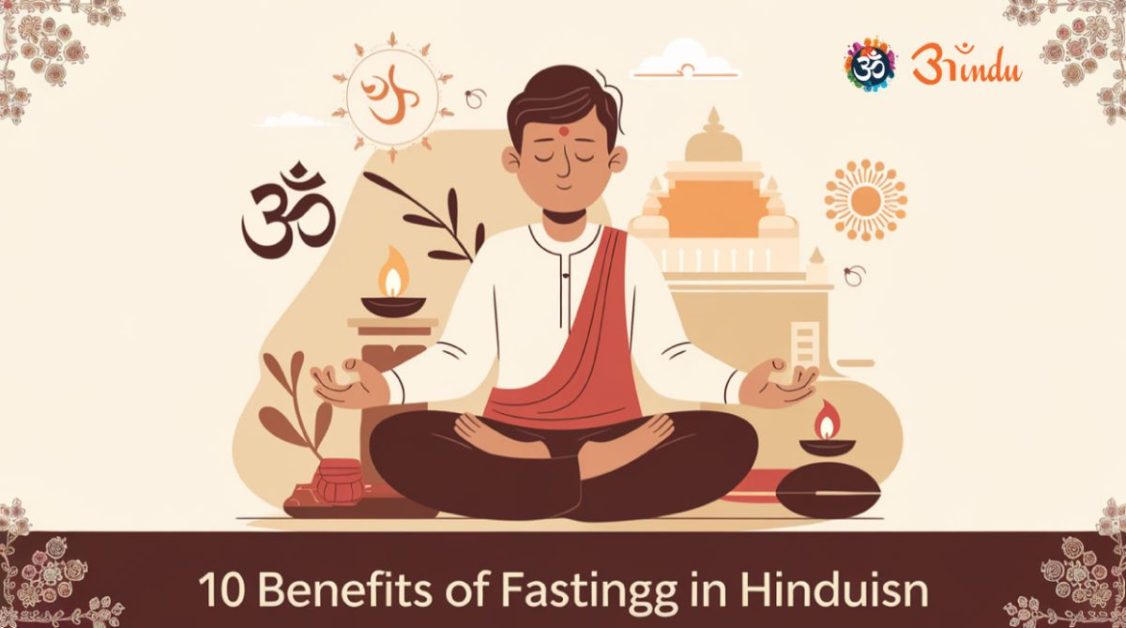
Fasting, a practice observed across various cultures and religions, holds a special significance in Hinduism. Beyond its ritualistic importance, benefits of fasting (Hinduism) extend to both physical and spiritual well-being. This blog post explores ten key benefits, delving into both the science and spirituality behind this ancient practice.
Explore Blog Content
ToggleFasting: A Path to Holistic Well-being
Benefits of fasting (Hinduism) are numerous, encompassing physical health, mental clarity, and spiritual growth. It’s a practice that has been passed down through generations, deeply ingrained in the Hindu way of life.
Different Types of Fasts in Hinduism
Hinduism prescribes various types of fasts, ranging from complete abstinence from food and water to partial fasts involving restrictions on certain types of food. The specific type of fast observed often depends on the individual’s health, age, and spiritual goals.
"Many Hindu festivals, such as Navratri, Shivratri, and Ekadashi, involve specific fasting rituals and guidelines."
10 Benefits of Fasting in Hinduism
Here are ten compelling benefits of fasting in Hinduism:
- Physical Purification and Detoxification: Fasting gives the digestive system a rest, allowing the body to focus on repair and detoxification. It can help to eliminate toxins, improve digestion, and boost the immune system.
- Improved Metabolic Health: Fasting can improve insulin sensitivity, regulate blood sugar levels, and reduce the risk of type 2 diabetes. It can also contribute to weight management and improved cardiovascular health.
- Enhanced Mental Clarity: Fasting is believed to have a positive impact on mental clarity and cognitive function. It can help to sharpen the mind, improve focus, and reduce stress and anxiety.
- Spiritual Growth and Self-Discipline: Fasting is often associated with spiritual discipline and self-control. It requires willpower and commitment, fostering a sense of inner strength and resilience. It’s a way to demonstrate devotion and deepen one’s connection with the divine.
- Emotional Purification: Fasting can be a time for introspection and self-reflection. It can help to cleanse emotional baggage, release negative emotions, and cultivate inner peace.
- Increased Awareness and Intuition: By quieting the mind and senses, fasting can enhance self-awareness and intuition. It can create space for deeper connection with one’s inner self and the divine.
- Cultivation of Humility and Gratitude: Fasting can be a humbling experience, reminding us of our dependence on the divine for sustenance. It can also foster gratitude for the blessings in our lives.
- Strengthened Connection with the Divine: Fasting is often undertaken as an act of devotion and surrender to the divine. It can deepen one’s spiritual connection and foster a sense of closeness to God.
- Community Bonding and Shared Experience: Fasting is often observed collectively during festivals and religious occasions, strengthening community bonds and creating a shared experience of devotion.
- Opportunity for Seva (Selfless Service): The time and energy saved during fasting can be directed towards acts of seva (selfless service) and helping others, further enhancing the spiritual benefits of the practice.
"Health is wealth. Peace of mind is happiness. Yoga shows you the way."Swami Sivananda
The Importance of Intention and Preparation
Fasting should be undertaken with the right intention, which is usually spiritual purification or devotion. It’s also important to prepare the body and mind before embarking on a fast. Consulting with a healthcare professional is advisable, especially for those with pre-existing health conditions.
Balancing Physical and Spiritual Benefits
While the spiritual benefits of fasting are often emphasized, the physical benefits should not be overlooked. A healthy body and mind are essential for spiritual progress.
Conclusion
The benefits of fasting (Hinduism) are multifaceted, encompassing physical, mental, and spiritual dimensions. It’s a powerful practice that can lead to holistic well-being and a deeper connection with the divine.
FAQs Section
- What are the different types of fasts observed in Hinduism?
There are various types, including complete fasts, partial fasts, and restrictions on specific foods, depending on the occasion and individual. - Is fasting safe for everyone?
No, it’s essential to consult a healthcare professional before fasting, especially if you have any health conditions. - What is the spiritual significance of fasting?
Fasting is seen as a way to purify the mind and body, cultivate self-discipline, and deepen one’s connection with the divine. - How can I prepare myself for a fast?
It’s important to gradually reduce food intake before the fast and stay hydrated. - What should I eat when breaking a fast?
It’s best to break the fast with light, easily digestible foods. - How often should I fast?
The frequency depends on individual circumstances and the type of fast. It’s best to follow the guidance of religious elders or healthcare professionals. - Can fasting help with weight loss?
Yes, fasting can contribute to weight management, but it’s not a substitute for a healthy diet and exercise. - What are some common misconceptions about fasting?
Some misconceptions include that fasting is only about food, that it’s harmful, or that it’s only for ascetics.







